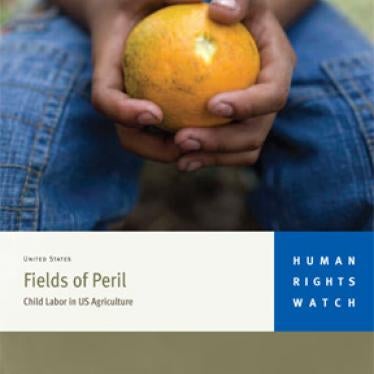"Marcos" was 12 when he started cutting Christmas trees in North Carolina. He sometimes skipped school, he told me, wielded a chainsaw and breathed pesticides. Summers he harvested tomatoes and cut strawberry roots. No one ever asked him how old he was: "You just come if you can work."
Hundreds of thousands of children like Marcos are working for hire on farms across the United States-weeding, harvesting, and packing our fruits and vegetables, as well as cotton, tobacco and other crops. Because of an exception in federal law, they can work for hire at far younger ages, for far longer hours, and in far more hazardous conditions than all other working children.
Farmworker children typically start at age 11 or 12, working 10 or more hours a day during summers and weekends, and sometimes on school days. Many start earlier, though-some told me they started as young as 7. The long hours take a real toll on their education. Young farmworkers drop out of school at four times the national rate.
U.S. child labor laws, which date to America's more rural era, contain a dangerous double-standard. Outside of agriculture, children must be at least 14 to work. Even then the jobs they can perform and their hours are tightly restricted. But there is no minimum age for work on small farms with parental permission, and children 12 and up may work for hire on any farm. School hours are off-limits, but otherwise there are no restrictions on how many hours they can work.
Child farmworkers die on the job more often than children in any other occupation. And federal law allows children in agriculture to do jobs at 16 that are prohibited as too "hazardous" for anyone below age 18 in other sectors.
This legal loophole isn't just bad for children, it is also discriminatory. Such weak labor protections fall overwhelmingly on Hispanic workers, about 80 percent of hired crop workers.
Poverty often presses farmworker children to work. But the U.S. government doesn't sacrifice the health and education of poor children in other industries. Several mothers have told me they later regretted sending their children to work-without a high school diploma their children were left with few options besides a lifetime of farmwork and the accompanying poverty. The fact that the work is legal presents it as a legitimate choice.
Some work can help teenagers develop discipline and skills, and contribute to their families' and their own basic needs. But when children work for too long, at such young ages, in such dangerous jobs, their future is compromised. It's time to close the loophole in federal law that endangers farmworker children by amending the U.S. Fair Labor Standards Act to apply the same protections to hired children in agriculture as already apply to all other working children.
"I really didn't have a childhood and I don't want [my own children] to go through what I did," Marcos, then 17, told me. "You're a kid only once. Once you get old you have to work."
Zama Coursen-Neff is deputy children's rights director for Human Rights Watch, and author of "Fields of Peril: Child Labor in US Agriculture."








